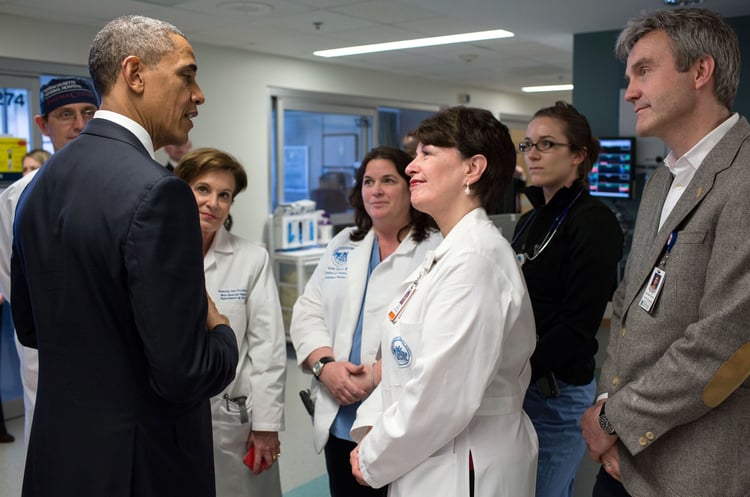
Sizable regulations enforced upon physician groups are holding practice executives to a glowing screen late nights and through the weekend. Practices are dedicating substantial hours and personnel to determine which value-based initiatives to focus on in the coming years in order to remain profitable.
One thing that remains true is that physicians who bill Medicare more than $30,000 in Part B and provide care for more than 100 Medicare patients a year are subject to the Quality Payment Program (QPP) of MIPS or APMs under CMS’s MACRA reimbursement regulations. Several details including practice structure, size, and reporting capabilities, will determine the category under MACRA in which it applies.
CONTINUE READING
Topics:
Closed-Loop Referrals,
MACRA,
Referral Automation,
Automated Referral Management,
MIPS,
CMS

Inefficiencies in the patient referral process plague practices by increasing the administrative burden on providers and front-office staff. Internests and family practicioners dedicate nearly 20% of their time to administrative tasks1 while practice managers and medical receptionists can waste up to 30 minutes on the phone chasing down patient information2. According to a paper in the International Journal of Health Services, "more extensive use of electronic medical records [is] associated with a greater administrative burden."
Disconnected practices are struggling to exchange clinical information and communicate securely without interruptive phone calls and faxes. Referral partners on different EHRs are left with lackluster options, such as sending transitions of care and last office notes into a Direct Secure Messaging void with hopes of receiving a consult report back.
CONTINUE READING
Topics:
Closed-Loop Referral Management,
Referral Workflow,
Referral Automation

Patient Centered Medical Home (PCMH) embodies the current trajectory of healthcare in that the patient is the focus of the medical model. The National Committee for Quality Assurance’s (NCQA) PCMH program is vastly adopted, with more than 12,000 practices, 60,000 clinicians, and 100 payors participating. In fact, 1 in 6 eligible physicians in the U.S. practices in an NCQA-Recognized PCMH.
With the objective to strengthen patient-provider relationships, reduce healthcare costs, and improve quality, NCQA continues to accelerate the growth of value-based care with the remodel of their PCMH program. Changes to the new PCMH model reduces the burden of the reporting process and focuses on increased healthcare quality and practice performance.
CONTINUE READING
Topics:
Care Coordination,
Healthcare Analytics,
Value-Based Care,
PCMH

Independent primary and speciality care practices have challenging years ahead. MACRA, MIPS, APMs, and the ACA are posing uncertain regulations and complicated payment models.
Despite this uncertainty, there is one thing that’s clear: independent practices must prepare to take on risk in order to stay profitable.
We sat down with Mark Kissinger, executive director of Genesis Medical Associates, to get the inside scoop on the challenges a large independent primary care practice faces in a value-based care and regulatory-driven world.
CONTINUE READING
Topics:
Care Coordination,
Coordinated Care,
Referral Network,
Closed-Loop Referral Management,
Value-Based Care

Once considered a critical component of meaningful use, DSM (Direct secure messaging) within an EHR poses significant limitations to referral management. While it conveys information electronically within a practice, DSM alone does not provide for comprehensive data exchanges between PCPs and consulting physicians. The Journal of General Internal Medicine notes that communication breakdowns affect care delivery between two practices on different systems. Specialists report that, 86% of the time, they do not receive information from the PCP prior to the referral visit. Additionally, poor referral tracking leads to inappropriate or unnecessary referrals and inefficiencies in care delivery. DSM in EHRs presents inevitable challenges for both primary and specialty care practices.
CONTINUE READING
Topics:
Care Coordination,
Referral Management,
DSM,
EHR

Communication between primary care physicians (PCPs) and the specialists they refer patients to is paramount to the overall best outcome for the patient. Much of the communication breakdown lies in outdated protocols and manual workflows that some organizations continue to employ. In the past, many physicians referred patients to various specialists, but never followed up on the recommendation. The patient was left to make their appointment with the specialist. In those cases, as high as 50% of the patients never made the appointments or followed up on the physician's recommendation. As illustrated, improving referral adherence shouldn't solely be the responsibility of the patient.
CONTINUE READING
Topics:
Coordinated Care,
Referral Adherence,
Care Transitions

Former President Barack Obama and former Vice President Joe Biden both care a great deal about digital health technology systems. Even when they had less than two weeks left in the White House, physicians' ability to share patient health records digitally was top of mind — and on the same day, too!
According to Politico’s Morning eHealth newsletter, it was “the first time since the gods called this newsletter into existence [that] President Barack Obama and Vice President Joe Biden both talked on the same day about health IT”.
CONTINUE READING
Topics:
Coordinated Care,
Referral Network,
Interoperability,
HIT,
Healthcare Data,
Care Transitions

The traditional patient referral process is broken. Its primary shortcomings - poor communication and follow-up - have far-reaching consequences.
Consider these stats: Only half of referrals result in a completed appointment, according to the Archives of Internal Medicine. The Journal of General Internal Medicine found that, while 70% of PCPs report sending information to specialists, only 32% of specialists receive clinical information before seeing the patient. An Archives of Internal Medicine study shows that PCPs report not receiving consult reports about 40% of the time; and when reports are sent, the Journal of General Internal Medicine adds, they arrive at least seven days after the patient visit in 64% of cases.
CONTINUE READING
Topics:
Referral Network,
Referral Management,
Patient Adherence

The loop in communication and clinical documentation between healthcare providers has traditionally been open for many organizations. Often when referrals are made, they are left largely to the patient to schedule. Many physicians may not even check whether the patient was seen by the specialist until the patient's next appointment or if contacted for records.
There are a million moving parts to the healthcare landscape today, so it's understandable that follow up with referrals might slip through the cracks without a proper protocol. Unfortunately, the cost of poor care coordination can be exorbitant - for the patient's own health and for the physicians and organizations involved.
CONTINUE READING
Topics:
Care Coordination,
Referral Management,
Provider Accountability,
Direct secure messaging

What you don’t know can hurt you.
When practices fail to manage a standard and consistent patient referral process across all locations, patients get sicker. And when PCPs and specialists aren’t on the same page about a patient referral, urgent health conditions worsen while important diagnoses get missed or delayed.
But a defective referral communication process isn’t just a big problem for patient care - it’s also a big problem for medical practices’ morale and bottom lines. Practices often get sued for medical negligence when a patient referral falls through the cracks.
Referrals play a role in an immense number of medical malpractice claims. Patient handoffs in medical settings contribute to 20% of diagnostic errors that lead to malpractice suits1.
CONTINUE READING
Topics:
Referral Management,
Closed-Loop Referrals,
Malpractice










